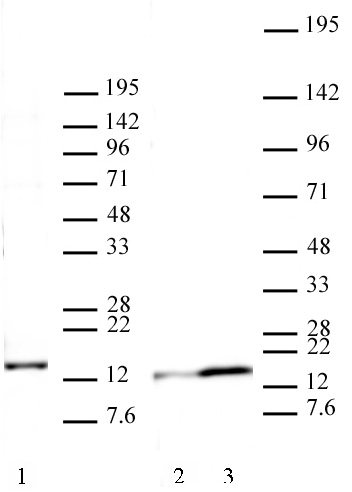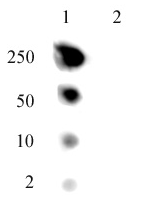Histone H2A.J antibody (pAb)
Host / Isotype
Rabbit / IgG
Reactivity
Human, Mouse
Applications
DB, WB
Cat No : 61793,61794 61793
Synonyms
Validation Data Gallery
Product Information
| Tested Applications |
DB, WB
Applications Validated by Active Motif: WB*: 1:500 - 1:2500 dilution DB: 1:1000 dilution *Note: many chromatin-bound proteins are not soluble in a low salt nuclear extract and fractionate to the pellet. Therefore, we recommend a High Salt / Sonication Protocol when preparing nuclear extracts for Western Blot. |
| Tested Reactivity | Human, Mouse |
| Host / Isotype | Rabbit / IgG |
| Class | Polyclonal |
| Type | Antibody |
| Immunogen | This antibody was raised against a peptide comprising amino acids 122-129 of human Histone H2A.J. |
| Full Name | Histone H2A.J antibody (pAb) |
| Synonyms | histone H2A, H2, histone, histones, H2A, histone-H2A, histoneH2A, pAb, polyclonal, antibody, antibodies |
| Molecular weight | |
| GenBank accession number | NP_808760 |
| RRID | AB_2793769 |
| Purification Method | Affinity Purified |
| Buffer | Purified IgG in PBS with 30% glycerol and 0.035% sodium azide. Sodium azide is highly toxic. |
| Storage | Some products may be shipped at room temperature. This will not affect their stability or performance. Avoid repeated freeze/thaw cycles by aliquoting items into single-use fractions for storage at -20°C for up to 2 years. Keep all reagents on ice when not in storage. |
Background Information
Histone H2A is one of the core components of the nucleosome. The nucleosome is the smallest subunit of chromatin and consists of 147 base pairs of DNA wrapped around an octamer of core histone proteins (two each of Histone H2A, Histone H2B, Histone H3and Histone H4). Histone H1 is a linker histone, present at the interface between the nucleosome core and DNA entry/exit points, and is responsible for establishing higher-order chromatin structure. Histone H2A.J is a histone H2A variant, a protein similar to canonical H2A but with different molecular identity and unique functions. Histone H2A.J, which is found only in mammals, is shown to be associated with senescence, accumulating in senescent fibroblasts and promoting expression of inflammatory genes. Therefore, H2A.J may contribute to chronic inflammation and age-related diseases.


